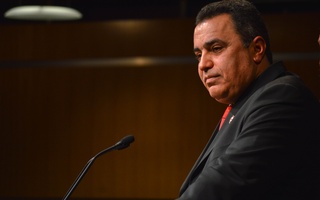UPDATED: January 26, 2017 at 2:15 p.m.
Harvard’s Center for Middle Eastern Studies opened its first field office in Tunisia last Tuesday in an effort to expand Harvard’s global presence and provide resources for scholarship in North Africa.
Hazem Ben-Gacem ’92, a London financier and former Lowell House resident, has donated an undisclosed sum for the office. Situated in Tunis, the new office joins more than eighteen Harvard international outposts, including locations in Botswana, China, and Chile.
A native Tunisian, Ben-Gacem said his primary motivation behind funding the office was to enable Harvard students to share in his enthusiasm for his country and immerse themselves in Tunisia’s history.
{shortcode-2dd5633c17d37eb950a4021e35ecc8e83c53b946}“The Harvard Office in Tunisia is a home for Harvard students away from home to broaden and continue their research, their education, their experience and know that there is a familiar environment,” Ben-Gacem said.
According to William Granara, the director of the Center for Middle Eastern Studies, Tunisia is a unique country to study, offering both ancient history and modern institutions.
“Tunisia is both historically and geographically well-located,” Granara said. “Geographically, it is in the heart of the Mediterranean so it is a part of the Mediterranean world, it’s part of Africa so it’s part of the African world, it’s an Arab country so it’s part of the Arab world, it’s a Muslim country so it’s part of the Islamic world, and I think one can say it’s part of the broader Middle East.”
The Tunisia location will offer summer and January term programs for Harvard affiliates interested in studying Arabic, conducting research in Tunisia’s archives or institutions, and exploring the country’s history.
According to Granara, student response to its Tunisia office has been overwhelmingly positive. Last summer, before the center officially opened, graduate students participated in an intensive Arabic writing course and did research in the Tunisian archives over winter break.
While the Tunisian office’s new offerings are primarily for graduate students, Ben-Gacem said the office hopes to expand to provide undergraduates with similar programs.
—Staff writer Gabriela J. Siegal can be reached at gabi.siegal@thecrimson.com. Follow her on Twitter @gabrielasiegal0.
This article has been revised to reflect the following correction:
CORRECTION: January 26, 2017
A previous version of this article incorrectly indicated that Hazem Ben-Gacem ’92 had endowed Harvard's office in Tunisia. In fact, he has donated a current-use gift.
Read more in University News
After Inauguration, Activists Present Demands to FaustRecommended Articles
-
French Propose Big 3 Foreign Ministers' Conference to Decide Western Policies in Middle EastPARIS, March 22--France moved today to convene a special three-power foreign ministers' meeting here to spell out a common Western
-
Over the WireCAIRO -- British Imperial troops smashing an Axis delaying action in a three-day battle, streamed through Agedabia tonight toward El
-
Over the WireLONDON--Smashing Allied air blows from Crete to Tunisia, involving the destruction or crippling of 51 enemy planes, and generally improved
-
 Harvard Today: February 26, 2015
Harvard Today: February 26, 2015 -
 Former Tunisian PM Describes Country’s 'Start-Up Democracy'
Former Tunisian PM Describes Country’s 'Start-Up Democracy'













